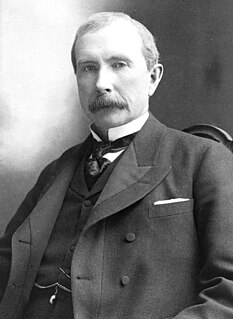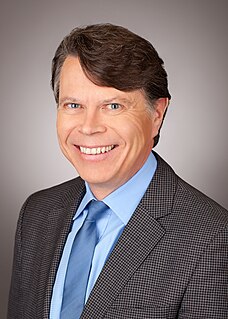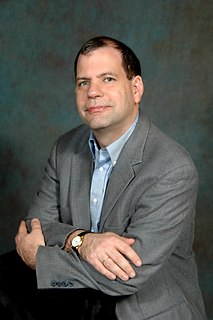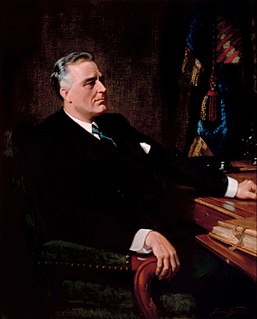Burton W. Folsom Jr. (born 1947, in Nebraska) is an American historian and author who held the Charles F. Kline chair in history and management at Hillsdale College from 2003 until his retirement in December 2016. [1]
Folsom received his B.A. from Indiana University in 1970, his M.A. from the University of Nebraska in 1973, and his doctorate in history from the University of Pittsburgh in 1976. Since 1988 he has edited Continuity: A Journal of History. He is a frequent columnist in the libertarian Freeman magazine and also contributes to other publications, writing in favor of free market economics and limited government. He taught American history at Murray State University in Kentucky from 1976 to 1994.
Folsom is a former associate of the Free Enterprise Institute and the Mackinac Center for Public Policy, both free market think tanks, and a frequent guest of the libertarian organization Foundation for Economic Education.
Folsom has written several books that argue against commonly held views about the role of capitalism in the social developments of the Industrial Revolution and the Gilded Age. He believes the term robber barons is a misnomer, and that many leaders in big business were constructive visionaries who benefited consumers and were integral to the development of industry. [2]
In his book The Myth of the Robber Barons, Folsom distinguishes between political entrepreneurs, who ran inefficient businesses supported by government favors, and market entrepreneurs, who succeeded by providing better and lower-cost products or services, usually while facing vigorous competition.
Folsom identifies the following people as market entrepreneurs:
He regards these people as political entrepreneurs:
Folsom writes about economics and US history for several large publications, including The Wall Street Journal and the National Review . [4] [5] In a 2010 Wall Street Journal editorial, Folsom argues that the New Deal did not contribute to economic recovery and may have actually exacerbated the Great Depression. Folsom argues that the New Deal did little more than trade temporary poverty relief for crippling tax rates and mountains of debt, and that the post-war recovery is best attributed to the rollback of taxes and regulations imposed under the New Deal. [4]
Folsom has created several short videos for the conservative educational website Prager University. His lessons focus on the history of American economic development and entrepreneurs such as John D. Rockefeller:
Crony capitalism, sometimes called Cronyism, is an economic system in which businesses thrive not as a result of free enterprise, but rather as a return on money amassed through collusion between a business class and the political class. This is often achieved by the manipulation of relationships with state power by business interests rather than unfettered competition in obtaining permits, government grants, tax breaks, or other forms of state intervention over resources where business interests exercise undue influence over the state's deployment of public goods, for example, mining concessions for primary commodities or contracts for public works. Money is then made not merely by making a profit in the market, but through profiteering by rent seeking using this monopoly or oligopoly. Entrepreneurship and innovative practices which seek to reward risk are stifled since the value-added is little by crony businesses, as hardly anything of significant value is created by them, with transactions taking the form of trading. Crony capitalism spills over into the government, the politics, and the media, when this nexus distorts the economy and affects society to an extent it corrupts public-serving economic, political, and social ideals.
In economics, a free market is a system in which the prices for goods and services are self-regulated by buyers and sellers negotiating in an open market without market coercions. In a free market, the laws and forces of supply and demand are free from any intervention by a government or other authority other than those interventions which are made to prohibit market coercions. Examples of such prohibited market coercions include: economic privilege, monopolies, and artificial scarcities. Proponents of the concept of free market contrast it with a regulated market in which a government intervenes in the exchange of property for any reason other than reducing market coercions.
Standard Oil Co. was an American oil-producing, transporting, refining, and marketing company. Established in 1870 by John D. Rockefeller and Henry Flagler as a corporation in Ohio, it was the largest oil refiner in the world at its height. Its history as one of the world's first and largest multinational corporations ended in 1911, when the U.S. Supreme Court ruled that Standard Oil was an illegal monopoly.

John Davison Rockefeller Sr. was an American business magnate and philanthropist. He is widely considered the wealthiest American of all time and the richest person in modern history. Rockefeller was born into a large and poor family in upstate New York that moved several times before eventually settling in Cleveland, Ohio. He became an assistant bookkeeper at age 16 and went into several business partnerships beginning at age 20, concentrating his business on oil refining. Rockefeller founded the Standard Oil Company in 1870. He ran it until 1897, and remained its largest shareholder.
Anti-competitive practices are business or government practices that prevent or reduce competition in a market. Anti-trust laws differ among state and federal laws to ensure businesses do not engage in competitive practices that harm other, usually smaller, businesses or consumers. These laws are formed to promote healthy competition within a free market by limiting the abuse of monopoly power. Competition allows companies to compete in order for products and services to improve; promote innovation; and provide more choices for consumers. Some business practices may be pro-competitive, economic methodological tests and empirical legal cases are used to test whether business activity constitutes as anti-competitive behavior.
In economics and business ethics, a coercive monopoly is a firm that is able to raise prices, and make production decisions, without the risk that competition would arise to draw away their customers. A coercive monopoly is not merely a sole supplier of a particular kind of good or service, but it is a monopoly where there is no opportunity to compete with it through means such as price competition, technological or product innovation, or marketing; entry into the field is closed. As a coercive monopoly is securely shielded from the possibility of competition, it is able to make pricing and production decisions with the assurance that no competition will arise. It is a case of a non-contestable market. A coercive monopoly has very few incentives to keep prices low and may deliberately price gouge consumers by curtailing production.
In the late 19th century, a captain of industry was a business leader whose means of amassing a personal fortune contributed positively to the country in some way. This may have been through increased productivity, expansion of markets, providing more jobs, or acts of philanthropy. This characterization contrasts with that of the robber baron, a business leader using political means to achieve personal ends.

Lawrence (Larry) W. Reed, also known as Larry Reed, is president emeritus of the Foundation for Economic Education (FEE), where he has served as the Humphreys Family Senior Fellow since May 2019. Before joining FEE, Reed served as president of the Mackinac Center for Public Policy, a Midland, Michigan based free-market think tank. To date, he remains Mackinac's president emeritus.

Antony Cyril Sutton was a British-American researcher, economist, historian, professor, and writer.

Donald Joseph Boudreaux is an American economist, author, professor, and co-director of the Program on the American Economy and Globalization at the Mercatus Center at George Mason University in Fairfax, Virginia.

Tyler Cowen is an American economist, columnist and blogger. He is a professor at George Mason University, where he holds the Holbert L. Harris chair in the economics department. He hosts the economics blog Marginal Revolution, together with co-author Alex Tabarrok. Cowen and Tabarrok also maintain the website Marginal Revolution University, a venture in online education.

Robber baron is a derogatory term of social criticism originally applied to certain wealthy and powerful 19th-century American businessmen. The term appeared as early as the August 1870 issue of The Atlantic Monthly magazine. By the late 19th century, the term was typically applied to businessmen who purportedly used exploitative practices to amass their wealth. These practices included exerting control over natural resources, influencing high levels of government, paying subsistence wages, squashing competition by acquiring their competitors to create monopolies and raise prices, and schemes to sell stock at inflated prices to unsuspecting investors. The term combines the sense of criminal ("robber") and illegitimate aristocracy.
The term political entrepreneur may refer to any of the following:
Left-libertarianism, also known as egalitarian libertarianism, left-wing libertarianism or social libertarianism, is a political philosophy and type of libertarianism that stresses both individual freedom and social equality. Left-libertarianism represents several related yet distinct approaches to political and social theory. In its classical usage, it refers to anti-authoritarian varieties of left-wing politics such as anarchism, especially social anarchism, whose adherents simply call it libertarianism, Communalism, and Libertarian Marxism, which are collectively termed libertarian socialism. A portion of the left wing of the green movement, including adherents of Murray Bookchin's social ecology, are also generally considered left-libertarian.
The Old Right is an informal designation used for a branch of American conservatism that was most prominent from c. 1910 to the mid-1950s but never became an organized movement. Most members were Republicans, although there was a conservative Democratic element based largely in the Southern United States. They are termed the "Old Right" to distinguish them from their New Right successors who came to prominence in the 1960s, 1970s and 1980s.
In the United States, libertarianism is a political philosophy promoting individual liberty. According to common meanings of conservatism and liberalism in the United States, libertarianism has been described as conservative on economic issues and liberal on personal freedom, often associated with a foreign policy of non-interventionism. Broadly, there are four principal traditions within libertarianism, namely the libertarianism that developed in the mid-20th century out of the revival tradition of classical liberalism in the United States after liberalism associated with the New Deal; the libertarianism developed in the 1950s by anarcho-capitalist author Murray Rothbard, who based it on the anti-New Deal Old Right and 19th-century libertarianism and American individualist anarchists such as Benjamin Tucker and Lysander Spooner while rejecting the labor theory of value in favor of Austrian School economics and the subjective theory of value; the libertarianism developed in the 1970s by Robert Nozick and founded in American and European classical liberal traditions; and the libertarianism associated to the Libertarian Party which was founded in 1971, including politicians such as David Nolan and Ron Paul.

Before, during and after his presidential terms and continuing today, there has been much criticism of Franklin D. Roosevelt (1882–1945). Critics have questioned not only his policies and positions, but also charged him with centralizing power in his own hands by controlling both the government and the Democratic Party. Many denounced his breaking the no-third-term tradition in 1940.
Business history is a historiographical field which examines the history of firms, business methods, government regulation and the effects of business on society. It also includes biographies of individual firms, executives, and entrepreneurs. It is related to economic history. It is distinct from "company history" which refers to official histories, usually funded by the company itself.

The Entrepreneurial State: Debunking Public vs. Private Sector Myths is a 2013 book written by Mariana Mazzucato which argues that the United States' economic success is a result of public and state funded investments in innovation and technology, rather than a result of the small state, free market doctrine that often receives credit for the country's strong economy. Mazzucato argues that understanding the difference between the "myth" and the reality of this success is particularly important saying: "If the rest of the world wants to emulate the US model, they should do as the United States actually did, not as they say they did". The book was listed among the Financial Times best books of the year, and was reviewed in several publications including The New York Times and The Wall Street Journal. It is both praised and criticized by several social science journals, and has started numerous discussions among economists and social scientists around the world about the role of the state in the world of technological innovations.